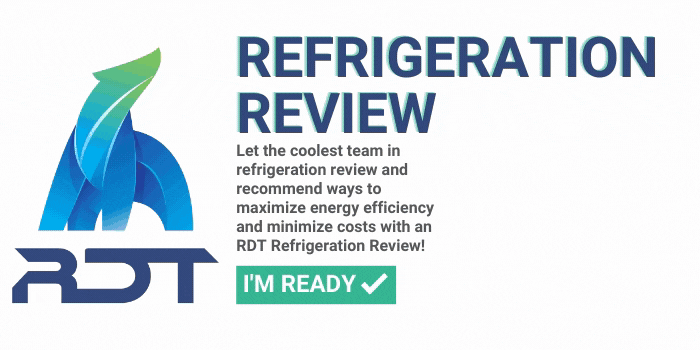How to Spot Refrigeration System Failures Before They Happen

Stay ahead of costly downtime with these early warning signs and expert tips.
When a refrigeration system fails, the consequences go beyond inconvenience. Spoiled product, food safety violations, lost revenue, and emergency repairs are just a few of the issues operators face when cold storage systems go down.
The good news? Most failures don’t happen without warning. If you know what to look for, your team can act early and often avoid bigger, more expensive problems.
At RDT, we’ve supported thousands of operations across the foodservice industry, from commercial kitchens and QSRs to convenience stores and institutional facilities. Across the board, the same warning signs tend to show up. Here’s what to watch for and what to do about it.
1. Fluctuating Temperatures
Even small temperature swings can signal that something’s wrong.
If a cooler that usually holds steady at 38°F starts drifting up to 42°F and then back down again, the system may be experiencing:- Low refrigerant charge
- A failing thermostatic expansion valve (TXV)
- Poor airflow or blocked coils
- Control-related issues
Why it matters: Repeated temperature fluctuations can compromise food safety and reduce the life of the compressor.
What to do: Consider using a monitoring system that tracks real-time temperatures and sends alerts for deviations. Tools like RDT’s Eco-Smart offer this kind of visibility.
2. Short Cycling
Short cycling—when your system turns on and off more frequently than normal—is often a symptom of:
- Pressure control issues
- Electrical issues
- Overheating
- Malfunctioning control boards
Why it matters: Frequent cycling puts added strain on the compressor, which can lead to premature failure.
What to do: A qualified technician should investigate. In many cases, adjusting control settings or replacing a faulty sensor can correct the issue.
3. Unusual Noises
If your refrigeration equipment starts making unfamiliar sounds—buzzing, grinding, rattling, or clunking—it’s time to pay attention.
These noises could indicate:
- Loose components
- Failing motors or fans
- Worn bearings inside the compressor
Why it matters: Sounds like these usually mean components are under stress or beginning to fail. Ignoring them can lead to more serious damage.
What to do: Schedule a maintenance check promptly to catch and resolve the issue early.
4. Ice Where It Shouldn’t Be
Ice buildup on evaporator coils or refrigerant lines isn’t just cosmetic. It’s often a warning sign that something’s off.
One common cause: door openings that last too long. When doors are opened for extended periods of time, warm, humid air from the kitchen infiltrates the walk-in and collects on the coldest surfaces, where it condenses and forms ice.
Why it matters: Ice can restrict airflow, reduce system efficiency, and eventually cause compressor burnout if left unaddressed.
What to do: Check for dirty coils, airflow obstructions, stuck defrost cycles, or door habits that might be introducing excess moisture into the space.
5. Rising Energy Bills
A steady increase in utility costs without a clear operational change might point to refrigeration equipment that’s working harder than it should.
Common causes include:
- Worn-out components
- Dirty condenser coils
- Refrigerant leaks
- Miscalibrated control settings
What to do: A preventative maintenance check or energy audit can help uncover inefficiencies and restore system performance. This often results in long-term savings.
Don’t Let a Breakdown Surprise You
While most refrigeration failures don’t happen overnight, spotting early signs requires visibility. More operators are turning to smart controls and remote monitoring to help keep systems running efficiently and avoid downtime.
At RDT, we design our systems with performance, reliability, and peace of mind in mind. From digital compressor management to real-time alerts, our technology helps operators identify potential issues early and act before failures occur.
Need help troubleshooting or planning ahead?
Have questions about optimizing your refrigeration system? Connect with our team for expert guidance and support.




